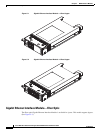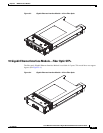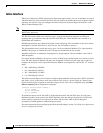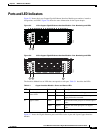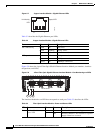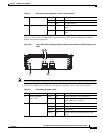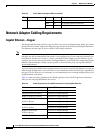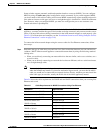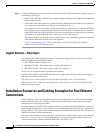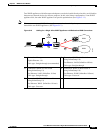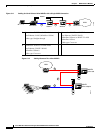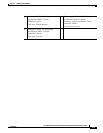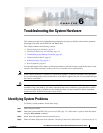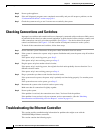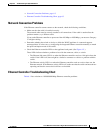
5-10
Cisco Wide Area Virtualization Engine 594 and 694 Hardware Installation Guide
OL-24619-02
Chapter 5 WAVE Interface Modules
Installation Scenarios and Cabling Examples for Fast Ethernet Connections
Step 2 Connect Fast Ethernet ports on both the LAN and the WAN sides of the WAVE inline appliance by using
the following cable types:
• On the LAN side of the connection, use a straight-through cable between the WAVE inline appliance
and the network device.
• On the WAN side of the connection, use the cable that is different from the cable that you would use
to connect the two network devices directly (as determined in Step 1).
For example, if you are connecting a router and a switch (two different devices) through the WAVE
inline appliance, use a straight-through cable on the LAN side of the connection and use a crossover
cable on the WAN side of the connection. (If you were connecting the two different devices directly,
you would use a straight-through cable, so use the crossover cable instead.)
If you are connecting two switches (or two similar devices), use straight-through cables on both the
LAN and the WAN sides of the WAVE inline appliance.
Figure 5-10 through Figure 5-12 show which cables to use for the WAVE LAN and WAN
connections between Fast Ethernet ports.
Gigabit Ethernet—Fiber Optic
The following three SFP+ pluggable transceiver modules are supported for use with the 2-port Fiber
Optic 10 Gigabit Ethernet Interface Module:
• SFP-10G-SR—Short range fiber xcvr
• SFP-H10G-CU3M— Three meter captive copper cable with xcvrs
• SFP-H10G-CU5M— Five meter captive copper cable with xcvrs
Transceivers not supported will be rejected by the software.
For fiber cable length reach and IEEE standards for the supported transceivers, refer to the pluggable
10G optics data sheet on Cisco.com:
http://www.cisco.com/en/US/prod/collateral/modules/ps5455/data_sheet_c78-455693.html
Optical reach is 137 m (449 ft) to any individual port. This allows for a total of 274 m (899 ft) when
operating in bypass mode.
Installation Scenarios and Cabling Examples for Fast Ethernet
Connections
WAVE appliances can be installed physically between two network devices (such as the branch office
router and branch office LAN switch) by connecting the WAVE inline network adapter ports to the
network devices using the proper cables.
If you are connecting a WAVE inline appliance between two devices using Gigabit Ethernet, you can use
either straight-through cables, crossover cables, or any combination of the two cable types, regardless of
the type of device. This section shows cabling examples for Fast Ethernet connections only, because Fast
Ethernet has specific cabling requirements.
The inline network adapter has four ports that are divided into two inline groups (see the “Ports and LED
Indicators” section on page 5-5). The WAVE appliance can be physically placed inline between two
distinct network paths, creating redundant WAN links. (See Figure 5-10.)



